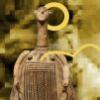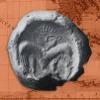This course concerns those with a particular interest in the history and culture of the olive tree and olive oil and its nutritional value.
Olive Oil

Old as humans, sacred as ancient rites, so valuable that they were considered gods' gifts to humankind, the olive tree and olive oil appeared in the Mediterranean Basin and became dominant and permanent fixtures of its landscape. This course delves into history and culture of the olive tree and olive oil, while it emphasises their nutritional value.
In this online course you will learn how to classify olive oil according to its quality characteristics and how to produce high quality olive oil. You will also learn how olive oil has been a source of inspiration and how several artists used it in order to create works of art from ancient times till today. The content of this course presents the varieties and characteristics of olives and the various types of olive oil that are destined to be consumed and used in recipes based on Mediterranean diet.
Last but not least, this course aims to define how important olive oil is, how it can benefit our daily diet and additionally how it can contribute to conserve a healthy lifestyle. All of the above will be analyzed further and in detail in this online course part of the Arts and Culture category.
The main purpose of the course is to get the elearner in contact with the olives and olive oil, to be able to recognize the importance and the benefits in their daily lives.
In particular the course focuses on :
- the route of the olive and olive oil through the ages and their importance in everyday life of ancient and modern Greeks with respect to nutrition, health, art, culture, tradition and religion.
- the varieties of olives grown in Greece, and the characteristics of the olives.
- the various types of olive oil marketed (virgin, extra virgin, refined, olive oil PDO, organic, etc.) depending on the composition and quality characteristics
- the production of high quality oil and the main types of mills
- the characteristics of the Mediterranean diet and the role of oil in this
- the benefits of olive oil in the daily diet and its contribution to health
Olive growing is one of the most important cultures associated with the life and evolution of humankind; the presence of the olive tree has an important part of daily nutrition since the appearance of human live in our planet. But how came the olive in the Mediterranean? What it's cultural history and its uses in the antiquity? What is its historical tradition, its links to religion and the arts? How can we classify olive oil, to distinguish and how we can produce high quality olive oil? What is the nutritional value of these products and their biological properties? Finally how is olive oli an important part of the Mediterranean diet and the benefits of its consumption? This programme aims to answer all these questions through information based on scientific and historical facts, research papers, videos and interviews designed to initiate the student to the magical world of olives and olive oil.
MODULE 1
Cultural history olives - olive oil
Lesson 1 Origin of the olive tree and its significance in antiquity
In this lesson we will examine the spread of the olive in the Mediterranean basin and refer to the myths that accompany it. We will also discuss the route of the olive and olive oil in ancient Greece from the Minoan to the classical period
Lesson 2 Olive in latter years and uses of olive oil
In this lesson we discuss the route of olive oil and olives in the Roman period, Byzantium and the Ottoman.Detailed reference to the uses of olive oil in antiquity including nutrition, grooming, in the treatment of diseases, and the Olympic and Panathenaic games.
Lesson 3 Elia - Olive oil, religion and art
Here, we describe the use of olive oil in religious ceremonies in ancient Greece and Christianity. Also we examine the olive and olive oil as a source of inspiration for artists from ancient times to today (poetry, literature, painting, etc.).
MODULE 2
Olive and olive oil
Lesson 1 The olive tree
In this lesson we describe the characteristics and composition of the olives, storage and harvest with a detailed reference to the varieties of olive growing in Greece.
Lesson 2 Olive oil
Moreover, in this lesson we discuss the main categories of olive oil and the factors that determine its quality. Tips to produce high quality olive oil, a detailed reference to the main types of mills, as well as storage and packaging methods are also discussed.
MODULE 3
The nutritional value of olives and olive oil-Olive oil and health
Lesson 1 Olives and olive oil
We describe the qualitative characteristics of the olive, the nutritional value, while referring to the components of the transported oil. Also, we further analyze the chemical composition of different types of oils and identify the main biological properties
Lesson 2 Mediterranean diet,Olive oil and health
In this lesson we discuss the important role of olive oil in the Mediterranean diet and describe the benefits to health. Olive oil is also examined as «pharmakon» that protects against a wide range of diseases such as hypertension, coronary heart disease, thrombosis, diabetes, cancer, etc.
The assessment will be based on:
-Questions closed / open type at the end of each lesson. The questions will cover the whole curriculum, while there will be questions of judgment
Online and distance training learning at National and Kapodistrian University of Athens offers a new way of combining innovative learning and training techniques with interaction with your tutor and fellow trainees from around the world.
The e-learning course is implemented via a user-friendly educational platform adjusted to the Distance Learning Principles. Courses are structured as weekly online meetings; interaction with the course tutor and other trainees takes place in a digital learning environment. The courses are designed to fit around your schedule; you access the course whenever it is convenient for you, however within the given deadlines.
The whole world becomes your classroom as e-learning can be done on laptops, tablets and phones as a very mobile method. Learning can be done on the train, on a plane or even during your trip to Greece!
The educational platform is a portal that offers access to electronic educational material based on modern distance learning technologies. The computer based nature of training means new technology is being introduced all the time to help trainees engage and learn in a tailored way that will meet their needs. E-learners have access to the educational platform with their personal code number in order to browse all relevant training material and interact with their instructors.
Moreover, an online communication system through own personal e-mail account is available in order to make the process easier and more interactive. Trainees can contact directly their tutors or the administration office of the course and share any concerns or anxieties related to the course in order to make the most of their experience.
Every week e-learners are provided with the relevant material, delivered either in the form of video-lectures, text notes and relevant presentations or as a combination of them. The educational material of the course is uploaded gradually, per educational unit. During the course, important info for the smooth conduct of the educational process, such as timetables for the submission of the exercises are announced on the Announcement section of the platform.
For successful completion of the course the e-learner should have fulfill her/his academic obligations, meaning should have submitted all corresponding assessment exercises and have achieved at least an average of 50% grade in the corresponding tests for each module. The score scale ranges from 0 to 100%. Finally, if the total score on one or more lessons of the course does not exceed 50%, trainees can ask for reassessment.
During the course trainees will be attending a training experience designed by academics and lecturers from the National University of Athens as well as from other Universities, Research Institutes and Cultural organizations around Greece.
Interactivity, flexibility and our long tradition guarantee that learning with us offers a successful and rewarding experience. Finally, access to a large variety of material and online resources available in each unit aims to excite your curiosity and guide you in exploring further your favourite topic. Part of the online material can be downloaded providing the chance to quickly refresh your memory after the completion of the course.









